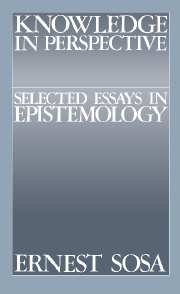Book contents
Introduction: back to basics
Published online by Cambridge University Press: 08 January 2010
Summary
Foundationalism postulates foundations for knowledge. Here agree its two branches — the rationalist and the empiricist — even if they disagree in their respective foundations, and disagree on how to erect a superstructure.
For the rationalist, only rational intuition can give a secure foundation, and only deduction can build further knowledge on that foundation. Here the model of knowledge is the axiomatic system, with its self-evident axioms and its theorems derived through logical deduction. Rationalists, therefore, were the logicists, who tried to reduce all mathematics to self-evident axioms.
More ambitious yet, Descartes sketched in his Meditations a strategy for rationally founding all knowledge, not only mathematical knowledge. But his strategy required substantive commitments that turned out to be less than axiomatic — commitments of natural theology, for example.
The failure of rationalism is evident both in Descartes and in logicism.
For their part, empiricists accept not only foundations by rational intuition but also foundations by sensory experience. Equally unsuccessful, however, was their project of reducing all physical reality to sensory experience — whose apotheosis is Carnap's phenomenalism. Besides, as Hume showed, the future cannot be predicted deductively: The reasoning required outstrips logical deduction.
Empiricism thus becomes more liberal than rationalism in two respects: First, it accepts a broader foundation, provided not only by rational intuition but also by sensory experience; second, it admits not only deductive reasoning but also inductive reasoning.
- Type
- Chapter
- Information
- Knowledge in PerspectiveSelected Essays in Epistemology, pp. 1 - 12Publisher: Cambridge University PressPrint publication year: 1991



